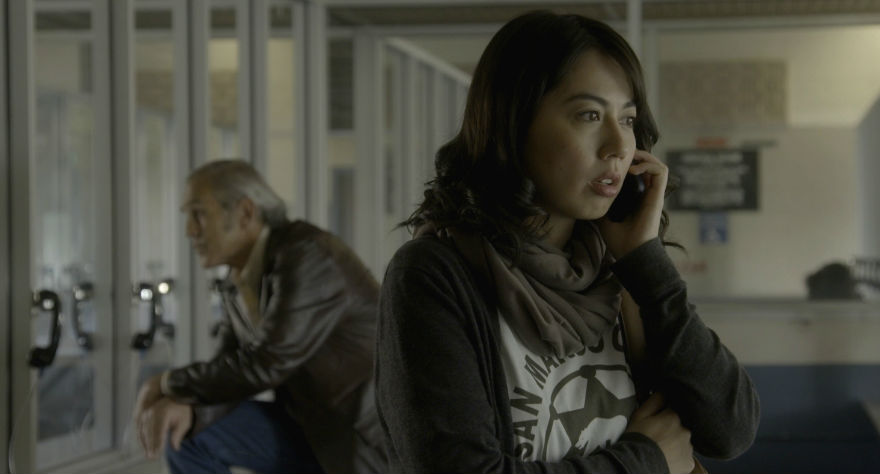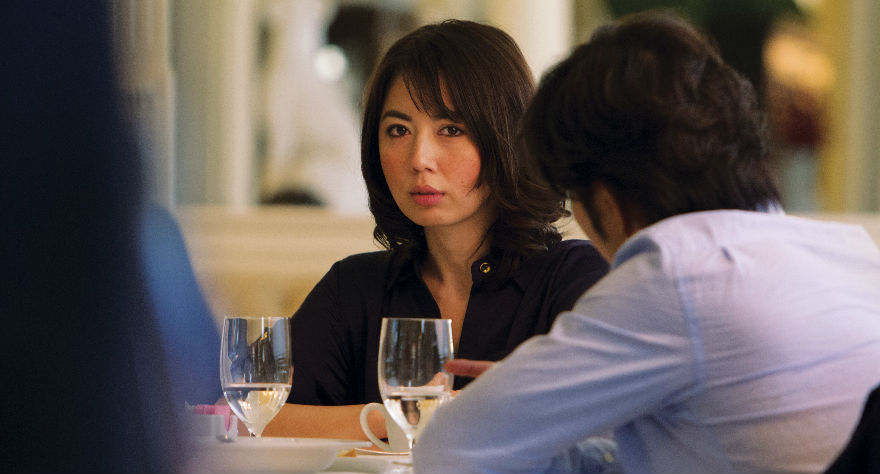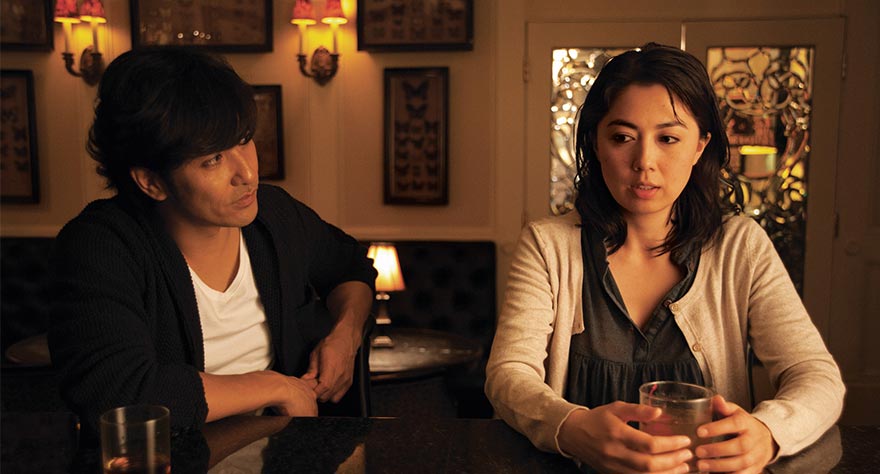Dave Boyle Talks ‘Man From Reno’, the Make-Up of a Mystery

After directing a handful of quirky, cross-cultural comedies to start off his still budding career, Dave Boyle thought that for his fifth film he’d tread darker waters. Man From Reno is a tense, chilling mystery-thriller set on the foggy streets of San Francisco. It follows a popular Japanese mystery novelist named Aki (Ayako Fujitani) who, while ducking the Japanese spotlight via a solo excursion to San Francisco, meets a handsome man with whom she shares a night of romance. In the morning he suddenly disappears from the hotel room and leaves behind a trail of clues (irresistible to any mystery writer) that lead Aki to a missing person case being conducted by a crusty small town sheriff (Pepe Serna). An immaculately orchestrated mystery with twists and turns you’ll never see coming, Man From Reno marks a new chapter in Boyle’s career. A lifelong mystery addict, he believes he’s found his calling directing intricately plotted thrillers. After watching Man From Reno, it’s hard to disagree.
While in San Francisco promoting the film, we talked to Boyle about making the kind of movie he likes to watch, staying one step ahead of the audience, the finer details of plotting a mystery, his restrained storytelling approach, his favorite “swerve” in the movie, the magic of San Francisco, creating more Asian stories in cinema, and much more.
Man From Reno is playing now in limited release. Visit manfromrenomovie.com for more info.

I feel like it’s every film geek/aspiring filmmaker’s dream to make a really good noir thriller. How does it feel to live the dream?
It makes me want to make more! I really liked doing it. Making something that had a real construction to it was really satisfying. I kind of found through this experience that I’m not the “slice of life” guy. I need that engine of a plot in order for my true skill set to shine through, I think. It was an absolute pleasure to play in this playground.
Was it like hitting the reset button on your career?
Yeah, to a certain degree. I’m certainly proud of all my films. But if I walk up to the marquee and see what’s playing, this is the kind of movie I’d be most inclined to pick. So that’s probably the kind of movie I’d be making.
Sometimes I talk to filmmakers and musicians, and a lot of times the genre they create in is not necessarily the genre they enjoy most as a consumer. It’s cool that you’re good at making the kind of movies you like to watch.
Honestly, this is my fifth feature, and I think if I tried something this narratively ambitious my first time out, the results would have been scary. The experience of doing those movies was strictly character-driven and didn’t have a strong plot of an engine. It taught me the nuts and bolts of filmmaking.
You’re doing classic stuff in the movie, but it doesn’t feel retro or derivative. As far as the plot, you do some sleight-of-hand stuff that’s really intricate.
When it comes to mysteries, the audiences’ antennas are up. We’ve been so trained by Law & Order and CSI…people are just drowning in mystery narrative. There are also people like me, who are addicted to reading mystery books. You can enjoy them even though you predict every twist and turn in the story. The clichés and tropes of the genre are part of the pleasure of the genre. But our challenge here was to make something that was a really wild ride, even for die-hard genre fans. We didn’t want them to see where the story was taking them. It’s a lot of fun to construct that kind of labyrinthine plot and still have an emotional core to it.
I thought the little things you did to divert our attention were really slick. Is it fun to craft those tricks and distractions?
Oh yeah. Filmmaking is all about problem solving, so when you have something that’s this construction-dependent—and by that I mean pattern, set-up, payoff; a clue, a solution, and what it means—we often hit a wall where we thought, this is too obvious. The audience is going to figure this out. Figuring out how to organically add that extra layer of complication or just distracting them to keep them in it, not thinking too much about every little detail because they’re caught up in the wave of narrative…that was so much fun. That’s really the reason you want to make a mystery.
It’s clearly gratifying for you to write this stuff, but how does it feel to see an audience reacting to it?
When the movie was all done and we watched it with an audience, that was a hugely satisfying moment. Up until then, it was a bit of blind faith that it was working. It comes down to a matter of taste, but when I see the usual Hollywood mysteries, they’re usually grossly oversimplified, and it almost always ends with some physical altercation or car chase or something. The mystery is solved by reel four, and then reel five is the car chase and shootout and it’s over. For me, the pleasure in the mystery genre is in the ones where you have that feeling continuing after the movie’s over. There’s that non-stop tension, and there’s not that release of this huge action sequence. I prefer mystery stories that have a lingering sense of dread after the last scene is played out.
The plot unfolds at a very controlled pace.
I wanted the audience to get caught up in the story of Aki before they even get interested in the details of the mystery. We follow along with her for 20 minutes or so where there’s not a crime necessarily happening. It’s all about leaving this breadcrumb trail of clues for the audience to follow. If you do too much of it, their interest dissipates. But if the storytelling is constructed correctly, they should be interested even though they’re not learning that much. They should be into the story even when very little is happening. I think that’s the central trick of this kind of filmmaking. Roman Polanski’s sort of the master of that. Rosemary’s Baby is constructed brilliantly in that one clue at a time is given until you finally figure out what’s going on at the end. That’s what differentiates this from suspense filmmaking, where you’re sort of aware of everything that’s going on; you know who the bad guys are early on, and it’s more about the anticipation of when the showdown is going to come. We wanted to do the opposite here and keep the main characters and the audience in the dark, wondering, “What does this all mean?!”
What’s your favorite narrative swerve you pull on the audience?
What the thing everybody is after turns out to be. That one detail was actually inspired by a real case. My vision for the film was to make a Nancy Drew type mystery, and it starts out that way, but it just gets darker and darker and darker. I think David Lynch described Blue Velvet as “The Hardy Boys go to hell” or something. I love narratives that morph as they go along. At the end of the movie, it’s revealed to be a different story than we thought we were watching at the beginning. Along the way, I wanted to have a plot that was worthy of an airport pot-boiler, something you just read for fun. There’s interesting and artistic character work going on, and at the same time, everything the intrigue surrounds is a bit funny, a bit off.

The movie is pretty dark, but I found myself laughing on a few occasions!
It’s meant to be fun, a good time at the movies. We really had to walk a fine line with the pacing, because if you go too fast with this stuff, people can’t really absorb the clues or get hypnotized by it. Humor is one of the most powerful weapons a suspense filmmaker has in their arsenal because it’s a great way to get across exposition, it’s a great way to pull some sleight-of-hand and distract people from what’s going on. One of the tricks of the mystery genre is, if you think your reader or viewer is feeling something, put that in the mouths of the characters. If there’s this avalanche of information coming at the characters, the audience is going to be confused, and you need to let them know that it’s okay to be confused! A great example of that is in The Usual Suspects where you can’t understand anything Benicio Del Toro’s character is saying, and then Gabriel Byrne is like, “Does anybody understand what this guy is saying?” All of a sudden, the audience is like, “We don’t need to pick up on what this guy is saying.”
Our generation is really aggressively skeptical when it comes to mystery movies. We’re always trying to get five steps ahead of the plot. I think your movie is more experiential, though, because your camerawork is so restrained. You kind of sink into what’s happening in the moment.
My cinematographer Rich Wong and I both feel that a designed approach and not being all over the place with the camerawork shows confidence. You need the audience to feel within ten seconds of starting the movie that they’re in good hands, and I feel that there is a tendency in modern filmmaking to over-cover things and do things to maximalist effect. All I think that does is desensitize people. I think it should be more seductive. You want to be drawn in, not shouted at.
We wanted to treat the movie like big movie, you know? We like our wide shots. We didn’t do ten shots where two would do. We tried to make it so the coverage was one shot that led to the next and not necessarily the usual cookie cutter coverage of a scene. Part of that is also budgetary consideration. When you had to fly through as much material as we had every day, it forces you to make choices. “Dump truck directing”, which is what Gordon Willis used to call it, is shooting massive amounts of footage and shaping it in the edit. I mean, inevitably, there’s stuff that’s shaped in the edit, but I respect a failed movie that has design to it more than a movie that’s all over the place.
I was thrilled to see Vesuvio, one of my favorite bars from my younger years, in the movie. I don’t think enough movies are shot in San Francisco.
I’m right there with you. I’m about to do another movie here, too. I’ve never lived up here, but I think San Francisco has a certain magic to it. Herzog always talks about the voodoo of locations, but I definitely feel a sense of history in San Francisco that I don’t feel in other American cities. There’s something about it that feels old, and yet at the same time it’s constantly renewing itself. There’s the tech thing and all these problems in San Francisco, but that’s not the city I was making this film in. This is the San Francisco of myth, you know? The one of our collective unconscious that I was trying to bring back to life in my own modest way.
I think it’s the perfect city for a mystery.
You said it. Alfred Hitchcock said it. It really is. There are so many things about this city that seem to work well. Even the fog is a huge thing.
You use the fog so well in the movie’s opening.
I think that’s my favorite scene. That was one of those scenes where we really threw down the gauntlet and said, how are we going to do this? A car accident in the fog. Figuring out how to do that using the old-school tricks of early cinema was really fun.
The film I think falls in line with a tradition of American mystery stories, but it also feels very modern, not retro.
This was a new genre for all of us. The writing, the planning. While we certainly did talk about different movies and books beforehand, once we went into pre-production, we made a conscious effort to stop talking about other movies and concentrate on what worked for this movie. We tried to walk a fine line to not make things feel so retro that they were goofy. But for the Paul Del Moral story, I wanted that it to have the texture of an older movie. We found an old Buick for him to drive around, and all of the characters’ wardrobe is slightly out of date, but not so much that it feels like hipster posturing. I didn’t want it to look like we raided a bunch of thrift stores. It all comes down to what feels right.
Pepe’s great, man.
I love Pepe! We’ve known each other for ten years, and I promised him that I’d write him a lead role one day. He doesn’t get to use it very often, but he has that gravelly gravitas. He usually plays crazy characters, and he’s brilliant at it, but to watch him settle into this character and let the lines on his face do the talking was so much fun. I felt lucky to have him. There was nobody else in my mind for that role.
A lot of my friends and chosen family are white, and a lot of times I don’t think they understand how, for Asians, not seeing Asian faces on movie and television screens drives you insane, little by little. It’s a subtle thing; I just don’t see people who look like me cast as leaders or heroes or objects of affection. It drives me nuts. Movies like yours help a lot.
I’ve always felt like this is a huge untapped talent pool and audience. While things are starting to change, like with the Randall Park show on ABC, there’s always been a perception in the industry that Asian actors and stories don’t sell. Unfortunately, the market statistics have proven them right again and again. There’s so much to say about that, but I feel like movies that reflect the diversity of the world we live in are just more interesting. In this movie, the opportunities to weave in some details of Japanese language and culture makes for a much more fun mystery than seeing Johnny Gunman trying to get the girl for the 80th time. I do hope things will change and people can get paid a living wage for making these movies and not get punished for it.
Your cast is great.
Ayako and Kazuki just great. Tetsuo Kuramochi, who plays her scientist friend, he’s somebody who Ayako introduced me to, actually, and he just has this magical presence on-screen. People always remember him.
What’s cool about Ayako is that she looks like a Hollywood starlet from decades ago. She has a glamorous quality to her that not a lot of actors have.
We wanted that feel. We wanted her to treat this like it was 1951 and she was Grace Kelly.
I heard that one of the reviews for your movie spoiled the ending.
A few of them have. I don’t think it’s out of malice or anything, but people just watch it and there’s a natural tendency to want to tell people about the secrets. I would urge people to just go in as blind as you can. We tried in the trailer to hide as much as we could, and even that gives away more than I’d like to. We had a good opening weekend last week, and I hope the word of mouth keeps spreading and people keep coming to check it out.
